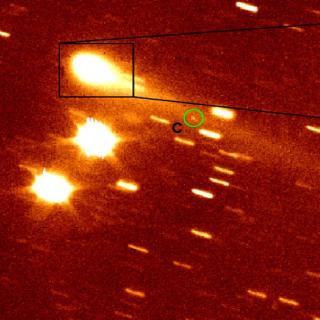Bibcode
Campins, Humberto; de León, Julia; Morbidelli, Alessandro; Licandro, J.; Gayon-Markt, Julie; Delbo, Marco; Michel, Patrick
Bibliographical reference
The Astronomical Journal, Volume 146, Issue 2, article id. 26, 6 pp. (2013).
Advertised on:
8
2013
Citations
50
Refereed citations
50
Description
Near-Earth asteroid (162173) 1999 JU3 (henceforth
JU3) is a potentially hazardous asteroid and the target of
the Japanese Aerospace Exploration Agency's Hayabusa-2 sample return
mission. JU3 is also a backup target for two other sample
return missions: NASA's OSIRIS-REx and the European Space Agency's Marco
Polo-R. We use dynamical information to identify an inner-belt,
low-inclination origin through the ν6 resonance, more
specifically, the region with 2.15 AU < a < 2.5 AU and i <
8°. The geometric albedo of JU3 is 0.07 ± 0.01,
and this inner-belt region contains four well-defined low-albedo
asteroid families (Clarissa, Erigone, Polana, and Sulamitis), plus a
recently identified background population of low-albedo asteroids
outside these families. Only two of these five groups, the background
and the Polana family, deliver JU3-sized asteroids to the
ν6 resonance, and the background delivers significantly
more JU3-sized asteroids. The available spectral evidence is
also diagnostic; the visible and near-infrared spectra of JU3
indicate it is a C-type asteroid, which is compatible with members of
the background, but not with the Polana family because it contains
primarily B-type asteroids. Hence, this background population of
low-albedo asteroids is the most likely source of JU3.
Related projects

Minor Bodies of the Solar System
This project studies the physical and compositional properties of the so-called minor bodies of the Solar System, that includes asteroids, icy objects, and comets. Of special interest are the trans-neptunian objects (TNOs), including those considered the most distant objects detected so far (Extreme-TNOs or ETNOs); the comets and the comet-asteroid
Julia de
León Cruz